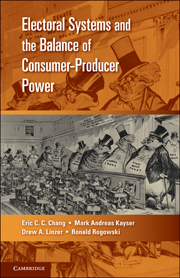Book contents
- Frontmatter
- Contents
- Acknowledgments
- 1 Introduction
- 2 Electoral Systems and Consumer Power: Theoretical Considerations
- 3 Electoral Systems and Real Prices: Panel Evidence for the OECD Countries, 1970–2000
- 4 Electoral Systems and Real Prices around the World
- 5 A Closer Look: Case Studies and Mechanisms
- 6 Socioeconomic Origins of Electoral Systems
- 7 Conclusion
- Bibliography
- Index
1 - Introduction
Published online by Cambridge University Press: 05 June 2012
- Frontmatter
- Contents
- Acknowledgments
- 1 Introduction
- 2 Electoral Systems and Consumer Power: Theoretical Considerations
- 3 Electoral Systems and Real Prices: Panel Evidence for the OECD Countries, 1970–2000
- 4 Electoral Systems and Real Prices around the World
- 5 A Closer Look: Case Studies and Mechanisms
- 6 Socioeconomic Origins of Electoral Systems
- 7 Conclusion
- Bibliography
- Index
Summary
“People of the same trade seldom meet together,…but the conversation ends in a conspiracy against the public, or in some contrivance to raise prices.” [I.x.]
“Consumption is the sole end and purpose of all production.…But…the interest of the consumer is almost constantly sacrificed to that of the producer.” [IV.viii.]
Adam Smith, The Wealth of NationsEven casual tourists – perhaps especially casual tourists – immediately notice one major difference among the countries they visit: prices vary. The restaurant meal that would cost $50 in Los Angeles can be had for $15 in Ensenada but will lighten one's wallet by $200 in Tokyo. More astonishingly, what appear to be identical and fully tradable goods – a writing tablet, a package of brand-name diapers – retails for far more in Norway than in Spain, or – as some pioneering economic field studies have shown (Engel and Rogers 2001) – for far more on one side of the street (which happens to lie in Switzerland and accepts only Swiss francs) than on the other (which is in France and accepts only Euros).
The person who actually moves to another country, and lives and works there for some time, notices another striking difference: levels of regulation vary. Whoever attempts to build a house, open a business, buy an automobile, or even change her address will find the process easy (or perhaps scarcely regulated at all) in some countries, but subject to repeated licensure and inspections in others.
- Type
- Chapter
- Information
- Publisher: Cambridge University PressPrint publication year: 2010

